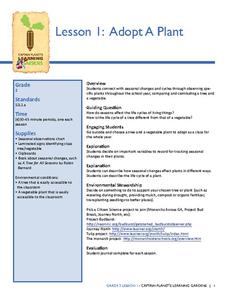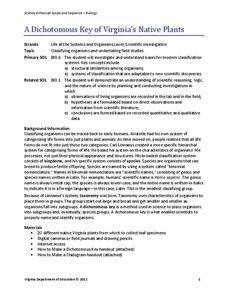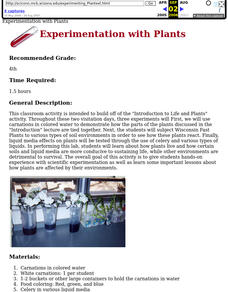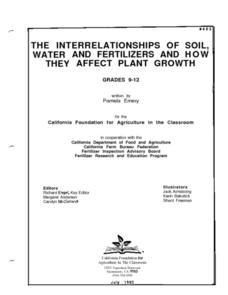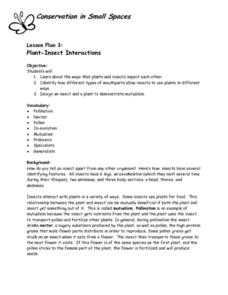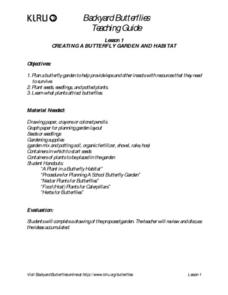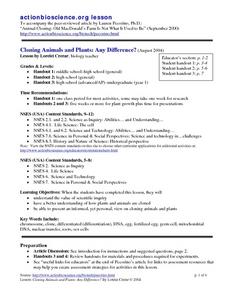Captain Planet Foundation
Adopt-A-Plant
Note the way that plants change during the season by adopting a plant on your school campus. After your class chooses their plant, they research the plant's needs, how it differs from other plants, find ways to support their plant's...
Curated OER
Plant Parts and their Function
Discover why plants are important to our world. View plant parts and categorize them as stems or buds. Students do a cut and paste of pictures of plants into correct categories. Students also plant a carrot top,and record...
Virginia Department of Education
A-Mazing Plants
Have your young scientists questioned why plants grow a particular way? Through this learning opportunity, scientists gain firsthand knowledge about how plants develop and various factors that affect rates of growth as they bring plants...
Virginia Department of Education
A Dichotomous Key of Virginia’s Native Plants
Can your class correctly classify plant species? Individuals explore native plants of the local environment and correctly classify them into their respective categories. They investigate differences in the plants and discuss similarities...
Curated OER
Fertilizers
Students examine the nutrient makeup in fertilizers. In this plant nutrient lesson students see the effects of common fertilizers on plants.
Curated OER
The Chemistry of Fertilizers
Students use a series of hands-on labs and activities, practice problems, discussions and writing assignments, students investigate about fertilizer chemistry as they break compounds into ions, make a fertilizer and test various...
Curated OER
Plants And Pollination
High schoolers describe sexual reproduction in plants, including the process of pollination, how insects assist in pollination, and how pollination differs from fertilization. They also explore the importance of honey bees to Arizona...
Curated OER
Experimentation With Plants
Fourth graders experiment with different varieties of plants and draw conclusions after performing a series of lab activities. A very helpful student worksheet is given. This is a nicely done introductory lesson for life science.
Curated OER
Children's Literature Across the Curriculum Ideas: The Magic School Bus Plants Seeds
Pupils read The Magic School Bus Plants Seeds by Janna Cole. They complete a variety of cross-curricular activities surrounding the study of plants and seeds. Included are reading, art, math, science, writing, social studies, and library...
Curated OER
Plant Pollination and Fertilization
Fourth graders research and apply knowledge about plant pollination and fertilization in this lesson. They color on a flower diagram the anther, the pistil, the pollen, the pollen tube, the ovary, and the egg to show the process of...
Curated OER
The Interrelationships of Soil, Water and Fertilizers and How They Affect Plant Growth
Students examine how different nutrients in the soil and fertilizers affect plant growth. In groups, they participate in a role play in which allows them to see the interactions of humans and plants. They also read articles and record...
Curated OER
Does the increased use of fertilizers effect biodiversity?
Students conduct a hands-on lab activity in which they analyze a sample of water from a local stream or pond. They introduce a fertilizer solution into the sample and analyze and describe their findings.
Curated OER
Creating a Pollinator Garden
Students build a pollination garden. In this pollination instructional activity, students read directions and build a pollinator garden that will produce flowering plants for pollinator organisms to use in pollination of other plants.
Curated OER
Conservation in Small Spaces: Plant-Insect Interactions
Learners explore ways that plants and insects impact each other, identify how different types of mouthparts allow insects to use plants in different ways, and design an insect and a plant to demonstrate mutualism.
Curated OER
How Toxic Is It?
Students participate in an activity in which they investigate the scientific method and seed germination as well as practice graphing and metric measuring skills. Students examine toxicity by exposing Wisconsin Fast Plants seeds to toxic...
Curated OER
Prairie Scavenger Hunt
Middle schoolers take a close look at the prairie environment. They identify common plants and animals of the prairie. In addition, pupils work in teams in order to put together a presentation on a certain aspect of the prairie...
PBS
Creating a Butterfly Garden and Habitat
This complete set of instructions for creating your very own butterfly garden and habitat is so cool! With some seeds and the handy resources in this activity, you and your class will be able to determine which type of habitat is best...
Captain Planet Foundation
Worm Your Way Out of This
How can you provide healthy soil for your garden? Study worms, bacteria, and other microorganisms in a lesson about decomposition and organic compost. After discussing what you know about worms and watching a video, watch what worms do...
Curated OER
Carnivorous Plants
Students examine how carnivorous plants get their nutrients from animals. For this food web lesson students examine how the plants attract their prey and are given many onilne sources to research.
Curated OER
Cloning Animals and Plants: Any Difference?
Students examine the process in which plants and animals are cloned. They compare and contrast the two procedures and determine if there is a difference. They share their views on cloning to the class.
Curated OER
Eutrophication Lab
Learners examine the effects of detergents and fertilizers on aquatic life and describe algae. Students define the term eutrophication as the process by which a body of water, such as a pond, lake, stream, or river, has a sudden increase...
Curated OER
SOIL
Second graders name the various materials that comprise soil, including weathered rock and other organic matter; and explain that soils differ in their color, texture, capacity to retain water, and ability to support the growth of many...
Curated OER
Watch Me Grow
Students observe that plants need air, food, light, and water to survive. In this plant biology instructional activity, students observe the growth and development of two plants, one is the control plant and the other is denied...
Curated OER
Lesson 3: Life Cycle of Brassica Plants
Students investigate the life cycle of brassica plants. For this science lesson, students observe each stage in the life cycle of their plant. Students record their observations and graph the data. Students
